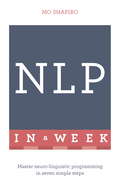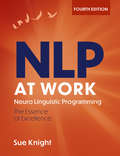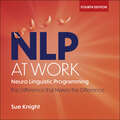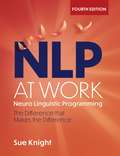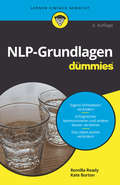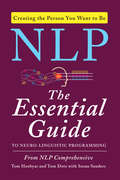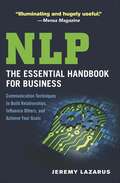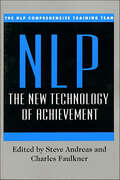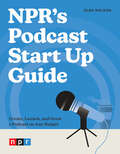- Table View
- List View
NLP In A Week: Master Neuro-Linguistic Programming In Seven Simple Steps
by Mo ShapiroNLP In A Week is a simple and straightforward guide to neuro-linguistic programming, giving you everything you need to know in just seven short chapters. From communicating more effectively to creating greater rapport with others, you'll discover the ability to change what isn't working in your life and increase what is.This book introduces you to the main themes and ideas of NLP, giving you a basic knowledge and understanding of the key concepts, together with practical and thought-provoking exercises. Whether you choose to read it in a week or in a single sitting, NLP In A Week is your fastest route to success:- Sunday: What is neuro-linguistic programming?- Monday: Identify empowering and limiting beliefs- Tuesday: Recognize how we represent information to ourselves- Wednesday: Use precision questions to find out what people mean- Thursday: Identify different communication filters- Friday: Use the six levels of change and reframing- Saturday: Increase your optionsABOUT THE SERIESIn A Week books are for managers, leaders, and business executives who want to succeed at work. From negotiating and content marketing to finance and social media, the In A Week series covers the business topics that really matter and that will help you make a difference today. Written in straightforward English, each book is structured as a seven-day course so that with just a little work each day, you will quickly master the subject. In a fast-changing world, this series enables readers not just to get up to speed, but to get ahead.
NLP at Work, 4th Edition: The Difference that Makes the Difference
by Sue KnightThis major new edition of Sue Knight's bestselling book NLP at Work has been extensively revised and updated, with an emphasis on the heart of NLP - becoming a model of excellence. In addition to a new slant to every chapter, there are three new chapters on the key things that make the biggest difference for the greatest results: Humor: enabling you to stand back and see things from a different perspective Clean questions: minimising yourself to find out the essence of the other person Time: understanding how what you get in life is influenced by your relationship to time past, present and futureNLP at Work has sold over 100,000 copies and is one of the most popular books ever published on the practical skills of NLP and how it can be applied in business. It transformed NLP from a peripheral art into an accessible, practical concept with relevant applications in the areas of influence, communication, negotiation, teamwork and coaching. Clear, readable and jargon free, this book will help you get to the essence of what makes you and your business excellent and unique.
NLP at Work: 4th Edition: The Difference that Makes the Difference
by Sue Knight'This book may help you to understand life more clearly' Paul Smith, fashion designerWelcome to THE book on NLP. The essence of NLP is the ability to study and reproduce excellence in yourself and to support others to do the same. NLP AT WORK helps you do that by developing an attitude of curiosity, naivety and learning - and giving you the ability to improvise with skill in real-time. Neuro Linguistic Programming is how you make sense of your world and, most importantly, how you make it what you want it to be: * Neuro: the way you filter and process your experience through your senses. * Linguistic: the way you interpret your experience through language. * Programming: the way you make sense of your experience to create your personal programme. NLP AT WORK is one of the most popular books ever published on the practical skills of NLP and how it can be applied in business. It transformed NLP from a peripheral art into an accessible, practical concept with relevant applications in the areas of influence, communication, negotiation, teamwork and coaching. Clear, readable and jargon free, this book will help you get to the essence of what makes you and your business excellent and unique.(P) 2020 Hodder & Stoughton Ltd
NLP at Work: The Difference that Makes the Difference
by Sue Knight'This book may help you to understand life more clearly' Paul Smith, fashion designerWelcome to THE book on NLP. The essence of NLP is the ability to study and reproduce excellence in yourself and to support others to do the same. NLP AT WORK helps you do that by developing an attitude of curiosity, naivety and learning - and giving you the ability to improvise with skill in real-time. Neuro Linguistic Programming is how you make sense of your world and, most importantly, how you make it what you want it to be: * Neuro: the way you filter and process your experience through your senses. * Linguistic: the way you interpret your experience through language. * Programming: the way you make sense of your experience to create your personal programme. NLP AT WORK is one of the most popular books ever published on the practical skills of NLP and how it can be applied in business. It transformed NLP from a peripheral art into an accessible, practical concept with relevant applications in the areas of influence, communication, negotiation, teamwork and coaching. This major new edition has been revised throughout and expanded to include a new section on coaching with NLP, showing how this approach is so different to traditional methods, and a new chapter on Metamessages. Clear, readable and jargon free, this book will help you get to the essence of what makes you and your business excellent and unique.
NLP-Grundlagen für Dummies (Für Dummies)
by Kate Burton Romilla ReadySind für Sie die drei Buchstaben NLP ein Buch mit sieben Siegeln? Die NLP-Expertinnen Kate Burton und Romilla Ready erläutern Ihnen, was Neurolinguistisches Programmieren ist und erklären anhand anschaulicher Beispiele aus Ihrer Berufspraxis, welche Grundannahmen sich hinter den drei Buchstaben verbergen und wie Sie NLP wirkungsvoll für Ihre Zwecke einsetzen. Wenn Sie die NLP-Werkzeuge erst einmal verinnerlicht haben und sie gebrauchen, werden Sie die tägliche Kommunikation mit Ihren Kollegen, Freunden und Ihrer Familie rasch verbessern. Mit wenig Aufwand lernen Sie Ihre Ziele konsequenter zu verfolgen, Sprachmuster zu entziffern und Missverständnisse zu vermeiden. "NLP-Grundlagen für Dummies" ist Ihr Weg zu gelungener Kommunikation.
NLP: The Essential Guide to Neuro-Linguistic Programming
by Tom Hoobyar Tom Dotz Susan SandersNLP (Neuro-Linguistic Programming) has helped millions to overcome their fears, increase their confidence, and achieve greater success in their personal and professional lives and relationships. Now, from the company that created NLP: The New Technology of Achievement-one of the bestselling NLP books of all time-comes NLP: The Essential Guide to Neuro-Linguistic Programming. This user-friendly guide, written by three seasoned NLP Master Practitioners and coaches, leads you on a personal journey in using and applying NLP in everyday life. Through their real-life stories, you will experience the NLP strategies you need to achieve specific results in business and in life. As you read NLP: The Essential Guide, you'll find yourself thinking in new ways and applying the techniques to your own personal challenges and opportunities for greater satisfaction.
NLP: The Essential Handbook for Business
by Jeremy LazarusThe “illuminating and hugely useful’“ guide to using Neuro-Linguistic Programming techniques to build relationships, influence others, and achieve goals (Mensa Magazine).NLP: The Essential Handbook for Business is a straight-talking, highly practical guide to using NLP to significantly improve your results at work. Whether you want to be a better leader, manager, negotiator, salesperson, or decision-maker, you can learn proven NLP techniques that will boost your career as well as the performance of colleagues and the organization itself.Using real-life examples and easy-to-follow exercises that apply to individuals, teams, and organizations, NLP: The Essential Handbook for Business shows you how to:Improve communicationAchieve your career goalsDevelop your influencing skillsHarness the mindset for successGain a greater understanding of what motivates youRemove the limiting beliefs holding you back from the success you deserveWritten in accessible, jargon-free language, NLP: The Essential Handbook for Business contains numerous examples and practical exercises that will help you use NLP to improve your career and achieve success at work, whether in the private or public sector, and regardless of your current role.“Jeremy Lazarus has managed to demystify the central tenets [of NLP], penning a guide that is equally relevant to trainers and individuals and far more accessible than its rivals.” —People Management magazine
NLP: The New Technology of Achievement
by NLP Comprehensive Training TeamNLP has already helped millions of people overcome fears, increase confidence, enrich relationships, and achieve greater sucess. Now the NLP Comprehensive Training Team has written a book that reveals how to use this breakthrough technology to achieve whatever you want.Short for neuro-linguistic programming, NLP is a revolutionary approach to human communication and development. In NLP: The New Technology of Achievement, you'll be guided step-by-step through specific programs for learning the characeristics of top achievers and creating a blueprint for unlimited sucess. Plus, an all-new twenty-one-day program created especially for this book provides you with the essential skills you'll need to achieve peak performance in business and life.
NOW PT (A): Should We Invest?
by George A. Riedel Mel Martin Amy KlopfensteinIn fall 2021, a team of students from the HBS Impact Investing Fund considered Neurologic Optimal Wellness Physical Therapy (NOW PT) for a potential investment. Dr. Banks, the founder of NOW PT, drove to visit patients. She sought an investment from the fund to open a brick-and-mortar clinic. However, the students believed that Dr. Banks might be more successful if she continued providing mobile PT services. At the conclusion of the case, the students must perform due diligence to test their hypothesis. What should their priorities be as they begin the due diligence process?
NOW PT (B): Should We Invest?
by George A. Riedel Mel Martin Amy KlopfensteinThis (B) case examines the results of the HBS Impact Investment Fund student team's diligence on Neurologic Optimal Wellness Physical Therapy (NOW PT). After examining Springfield's demographics, anticipated PT demand, local competition, and NOW PT's financial statements, the students realized that NOW PT would be more successful if it opened a brick-and-mortar clinic. The case appendix provides the students' Investment Committee deck, which readers can reference as an example of a thorough due diligence process. The conclusion of the case reveals the students' investment recommendation and its results.
NOWaccount
by William A. Sahlman Ramana Nanda Lauren BarleyIt was September 2013, and NOWaccount Network Corporation (NOW ) co-founders John Hayes and Lara Hodgson were putting the final touches on the presentation deck for their annual shareholders' meeting. Along with co-founder Stacey Abrams, the pair had designed NOW's business model three years ago, and the company was at a critical juncture. NOW offered a program-called NOWaccount-that provided working capital to small businesses by converting their trade receivables almost immediately into cash. Founded in December 2010, Atlanta, Georgia-based NOW was serving clients in nine states. With 2013 year-to-date revenue of roughly $100,000, NOW was financed with $2.5 million of founder, and friends and family equity. NOW's wholly-owned, not-for-profit special purpose entity (SPE), Trade Credit Guaranty Corporation (TCGC), purchased approved receivables, funding 90% of the invoice face values by electronic transfers into clients' bank accounts. As of September 2013, TCGC had purchased more than $13 million of small business trade receivables from more than 40 clients. Once TCGC reached a scale of approximately $150 million of funds in use for receivable purchases, the co-founders planned to tap into the securitization market for capital by issuing asset-backed securities (ABS), collateralized by a pool of receivables, much like the credit card industry. ABS would provide TCGC ongoing capital at a lower cost. The question the co-founders confronted was whether they should get to the $150 million securitization threshold by piecing together smaller pools of capital from credit unions and possibly smaller banks (a slower approach but one that did not involve dilution because it was all debt finance), or by accepting larger chunks of capital from a major global bank and a private equity firm, getting them much closer to the threshold but at the cost of significant dilution (35%) as these financiers were also looking for a combination of equity and warrants in NOW.
NPR's Podcast Start Up Guide: Create, Launch, and Grow a Podcast on Any Budget
by Glen WeldonFrom NPR comes the definitive guide to podcasting—featuring step-by-step advice on how to find a unique topic, tell the best stories, and engage the most listeners, as well as the secrets that will take your pod to the next level.Whoever you are, whatever you love, there&’s a podcast audience waiting for you, and in today&’s booming audio storytelling landscape, it&’s never been easier to share your voice with the world. But while the barrier to entry for podcast production is relatively low (just the cost of a mic and a laptop), the learning curve is steep—and quality matters. That&’s where NPR comes in. In NPR&’s Podcast Start Up Guide, Glen Weldon draws on NPR&’s extensive educational materials and army of talent—from recognizable hosts, such as Guy Raz (How I Built This), Gene Demby (Code Switch), Linda Holmes (Pop Culture Happy Hour), and Yowei Shaw (Invisibilia), to indispensable behind-the-scenes players, such as producers, engineers, and editors—to guide aspiring podcasters through the conception, creation, and launch of a podcast. Part master class, part candid informational interview with the best in the business, this book is a must-read for anyone who wants to make their dream of starting a podcast a reality.
NSC 68 and the Political Economy of the Early Cold War
by Curt CardwellNSC 68 and the Political Economy of the Early Cold War re-examines the origins and implementation of NSC 68, the massive rearmament program that the United States embarked upon beginning in the summer of 1950. Curt Cardwell reinterprets the origins of NSC 68 to demonstrate that the aim of the program was less about containing communism than ensuring the survival of the nascent postwar global economy, upon which rested postwar U.S. prosperity. The book challenges most studies on NSC 68 as a document of geostrategy and argues instead that it is more correctly understood as a document rooted in concerns for the U.S. domestic political economy.
NTT DOCOMO's Race to 5G
by Juan Alcacer Akiko Kanno Horst MelcherThe case, based on extensive interviews with NTT DOCOMO's technology leaders, focuses on the opportunities and challenges that NTT DOCOMO faces with the launch of infrastructure and services for 5G wireless telecommunication technology. With higher data rates and capacity, lower latency, and massive device connectivity, 5G could support new opportunities for growing NTT DOCOMO's business, which has been on a non-growth path since the early 2000s. The case details NTT DOCOMO's actions during previous transitions across wireless generations, illustrating the tradeoffs between being a first technological mover versus learning from the experience from other players in the market. It also highlights the intricacies of making a transition within a technological ecosystem, where coordination across different players is key for a successful strategy. Specifically, the case provides a platform to discuss the strategic options NTT DOCOMO is pursuing prior to launching 5G: What new services could they offer? Should they target corporate customers? Can NTT DOCOMO return to a sustainable growth path through 5G? How can they capture a larger share of the value created through 5G enabled internet ecosystems?
NTT DoCoMo (A): The Future of the Wireless Internet?
by Stephen P. Bradley Matthew SandovalNTT DoCoMo was established in 1992 and became publicly held in 1998. This case tracks how DoCoMo became the number one mobile phone company in Japan and how its i.mode service revolutionized the cellular phone market.
NTT DoCoMo, Inc.: Mobile FeliCa
by Thomas R. Eisenmann Masako Egawa Stephen P. Bradley Akiko KannoManagers of DoCoMo, Japan's largest mobile phone company, are formulating a strategy for mobile FeliCa: contactless integrated circuits that will be built into DoCoMo phones, allowing them to be used for quick and convenient retail or commuter fare payments, building entry, airline boarding passes, and other applications. DoCoMo's managers must determine how best to profit from mobile FeliCa. The options, which are not mutually exclusive, include: increasing mobile phone subscriber acquisition and retention rates by offering "sticky" differentiated new services; extracting monopoly rents from a joint venture (with Sony, FeliCa's inventor) that will license FeliCa technology to other mobile phone companies and application providers; and profiting from eMoney (retail payments) either through partnerships with incumbent financial services firms or by offering payment services directly.
NTT DoCoMo: Marketing i-mode
by Youngme Mooni-mode is a wireless Internet service offered in Japan by NTT DoCoMo. In just three years, the service has won over 30 million subscribers and achieved a 60% share of Japan's mobile Internet market, making it the most successful mobile data service in the world. It is now early 2002 and Keiichi Enoki, managing director of NTT DoCoMo's i-mode service, faces two challenges. On the domestic front, i-mode must fend off two strong competitors while managing the migration of i-mode's existing customer base to DoCoMo's new 3G (third-generation) wireless service. On the international front, the company must figure out a way to bring the i-mode model to U.S. and European markets, where consumers appear reluctant to adopt the mobile Internet.
NXTP Labs: An Innovative Accelerator Model
by Josh Lerner Maria Fernanda Miguel Laura UrdapilletaUnique accelerator fund in Latin America, facing challenges on how to keep growing, including development of venture capital fund and leveraging of entrepreneur ecosystem.
NYPD Confidential: Power and Corruption in the Country's Greatest Police Force
by Leonard LevittFor years, the police commissioner and the mayor of New York City have duked it out for publicity, credit, and power. Some have translated their stardom into success after leaving office, while others have been hung out to dry. In the battle for control of the country's most powerful police force, these high-status government officials have often chosen political expediency over public honesty. The result is a legacy of systemic corruption and cover-ups that is nothing less than shocking. Respected journalist Leonard Levitt has covered the NYPD for New York Newsday, and the New York Post among other papers. His columns have made him persona non grata in police headquarters. In NYPD Confidential, he reveals everything he's discovered throughout his decades-long career. With amazing details of backroom deals and larger-than-life powerbrokers, Levitt lays bare the backstabbing, power-grabs, and chaotic internal investigations that have run the NYPD's reputation into the ground in the past—and the forces conspiring to do so once again.
NYPD New
by James L. HeskettPolice Commissioner Bratten and his staff have led a process designed to create a results-oriented police department from one that previously emphasized and measured effort. With increasing budgeting pressures, the next phase of effort calls for increasing emphasis on productivity as well as a reduction in crime.
Nachbarrecht im Bauwesen: Schnelleinstieg für Architekten und Bauingenieure (essentials)
by Cornelius PfistererDieses essential vermittelt Ihnen die Grundbegriffe zum Grundstücks- und Nachbarrecht. Sie erfahren, was der Nachbar bei einem Bauvorhaben dulden muss und was er abwehren. Es wird erläutert, wie das Hammerschlags- und Leiterrecht zugunsten des Bauherrn auch formal richtig geltend zu machen ist. Wichtige Unterschiede zwischen öffentlichem und privatem Recht werden erklärt. Praktische Hinweise zur Gestaltung einer Nachbarvereinbarung ergänzen die Darstellung der Rechtsgrundlagen. Wer sich hier nicht auskennt, riskiert gerade bei innerstädtischen Bauvorhaben aufgrund nachbarlicher Einwendungen erhebliche Bauverzögerungen, Planungsänderungen und Mehrkosten. Hier finden Sie die rechtlich-formalen Lösungen, wenn eine Unterfangung des Nachbargebäudes erforderlich wird, Wärmedämmmaßnahmen im Bestand geplant sind oder ein Baukran das Nachbargrundstück überschwenken muss. In der 2., überarbeiteten Auflage wurden zahlreiche gesetzliche Neuerungen berücksichtigt und aktuelle Rechtsprechung eingepflegt.
Nachfolge und Verkauf von IT-Unternehmen: In 7 Schritten zum erfolgreichen Verkauf
by Volker JohanningDieses Buch hilft IT-Unternehmern, Eigentümern und Gesellschaftern von Systemhäusern und IT-Beratungshäusern die Unternehmensnachfolge und den Unternehmensverkauf optimal zu planen. Im Vordergrund stehen Themen wie "Wie viel ist mein IT-Unternehmen wert?", "Was sind die wesentlichen Schritte und Erfolgsfaktoren für einen gelungenen Unternehmensverkauf?", "Wie mache ich mein IT-Unternehmen übergabefähig?" und "Was kann ich frühzeitig tun, damit der Verkauf meines Unternehmens ein Erfolg wird?“.Anhand von 3 Beispielunternehmen zwischen 5 und 25 Mio. € Umsatz werden alle Phasen des Unternehmensverkaufs von Systemhäusern und IT-Dienstleistern praxisnah durchgespielt: Von der Zielsetzung und den Motiven des Verkaufs über die Berechnung des Unternehmenswerts bis zur Erstellung des Exposés sowie einer Due Diligence und der Verkaufsverhandlung.
Nachhaltig erfolgreiches Bankmanagement: Ein Paradigmenwechsel für Banksteuerung und Bankenregulierung
by Klaus LeusmannDieses Buch analysiert kritisch das vorherrschende bankbetriebswirtschaftliche Steuerungskonzept und schlägt praxisgerechte Lösungen für erkannte Defizite vor. Im zweiten Kapitel wird die „Wertorientierte Banksteuerung“ vorgestellt, so wie sie noch heute Kern der wissenschaftlichen bzw. universitären Lehre ist. Sie wird im Folgenden für die Zwecke dieses Buches auch als „Bankmanagement 1.0“ bezeichnet. Bei der Beschreibung steht nicht die Darstellung von mathematisch-statistischen Details für spezifische Problemstellungen im Vordergrund, sondern die methodischen und strukturellen Grundlagen, Annahmen und Modelle.Im dritten Kapitel werden sukzessive Schwachpunkte dieser Grundlagen der Banksteuerung analysiert und dabei mit Beispielen aus der Praxis unterlegt. Abschließend werden die Auswirkungen zusammenfassend beurteilt und Anforderungen an ein sachgerechtes „Bankmanagement 2.0“ abgeleitet.Das vierte Kapitel befasst sich einleitend mit den Zielen und der Organisation der Bankenaufsicht in der Marktwirtschaft und beschreibt anschließend die wesentlichen Inhalte der Regulierung. Abschließend wird erörtert, inwieweit die zu beobachtende zunehmende Detailregulierung zur Bekämpfung der negativen Symptome einer unzureichenden Steuerung geeignet ist und den ursprünglichen Anforderungen an eine staatliche Regulierung in einem marktwirtschaftlichen Umfeld noch gerecht werden kann. Es wird gezeigt, dass sich die Bankenregulierung u.a. aufgrund verwandter Probleme zur betriebswirtschaftlichen Risikosteuerung derzeit in einem strategischen Dilemma befindet, welches nur durch einen Paradigmenwechsel gelöst werden kann.Im fünften Kapitel werden für die im dritten Kapitel analysierten Steuerungsdefizite jeweils denkbare praxisgerechte Lösungsansätze abgeleitet und soweit bereits möglich in ihrer Wirkung belegt. Danach wird in grober Form aufgezeigt, wie mit einem Paradigmenwechsel das im vierten Kapitel herausgearbeitete Regulierungsdilemma aufgelöst werden kann. Abschließend wird dargestellt, wie die Lösungen der einzelnen Defizite zu einer neuen Integrierten Banksteuerung 2.0 zusammengefasst werden können.In der Zusammenfassung wird verdeutlicht, dass das Bankmanagement 2.0 als Voraussetzung für einen nachhaltigen Erfolg in Form eines Paradigmenwechsels die Mittel-Zweck-Beziehung von Kapital und Mensch wieder vom Kopf auf die Füße stellt.
Nachhaltig führen, nachhaltig belohnen: Wie ESG-Kriterien die Vergütung in DAX-Unternehmen prägen
by Chris Heiler Peter ZensDas Buch analysiert Vorstandsvergütungen in deutschen Unternehmen im Kontext von Nachhaltigkeit und ESG (Environmental, Social, Governance). Immer mehr Unternehmen sehen in den Themen wichtige strategische Erfolgsfaktoren. Die Autoren untersuchen, ob sich dies auch in den Vergütungsstrukturen der Vorstände von DAX-Segmentunternehmen widerspiegelt, und ziehen für ihre Analyse die veröffentlichten Vergütungsberichte der Geschäftsjahre 2022 und 2023 heran. Sie stellen fest, dass trotz historischer Reformen wie dem Gesetz zur Angemessenheit der Vorstandsvergütung (VorstAG) sowie dem Gesetz zur Umsetzung der zweiten Aktionärsrechterichtlinie (ARUG II) keine gesetzliche Pflicht zur ESG-Integration besteht. Die ESG-Einbindung erfolgt auf vielfältige Weise, was die Vergleichbarkeit erschwert. Im Laufe ihrer Analyse wird aber immer deutlicher, welche ESG-Ziele die Vergütung bereits prägen, und sie wagen einen Ausblick auf künftige Entwicklungen. Dieses Buch liefert wertvolle Einblicke für Führungskräfte, Investoren und Wissenschaftler, die sich mit der Zukunft der Vorstandsvergütung und der strategischen Bedeutung von ESG auseinandersetzen.
Nachhaltig gründen: Ein Praxisleitfaden für verantwortungsvolle Unternehmensgründungen
by Sascha GendersWenn Sie heute ein Unternehmen gründen, sollten Sie nachhaltiges Denken und Handeln von Beginn an in Ihre Planung und in den Aufbau des Unternehmens integrieren. Der kompakte und praxisorientierte Leitfaden gibt Ihnen zunächst eine Einführung in das Themenfeld Nachhaltigkeit und Unternehmensverantwortung. Kernstück des Fachbuches sind anschließend konkrete Hilfestellungen für die Planung Ihrer Existenzgründung und die Erarbeitung Ihres Businessplans – mit Berücksichtigung von Aspekten der Nachhaltigkeit in Ihrem Geschäftskonzept. Für Praxisnähe sorgen eine Vielzahl konkreter Tipps und Reflexionsfragen, die Sie bei der eigenen Standortbestimmung und Erstellung des Businessplans unterstützen. Das Buch richtet sich an Gründungswillige, Start-ups- und Interessierte zum Thema Nachhaltigkeit. Der Inhalt Nachhaltigkeit: Grundlagen, Konzepte und Bedeutung Nachhaltigkeit und Unternehmensgründungen Praxisleitfaden für einen (nachhaltigen) Businessplan Gründerperson, Geschäftsmodell, Produkt & Dienstleistung, Organisation, Recht, Wirtschaftlichkeit und Finanzierung
